Is it a mistake to equate Hanukkah and Christmas?
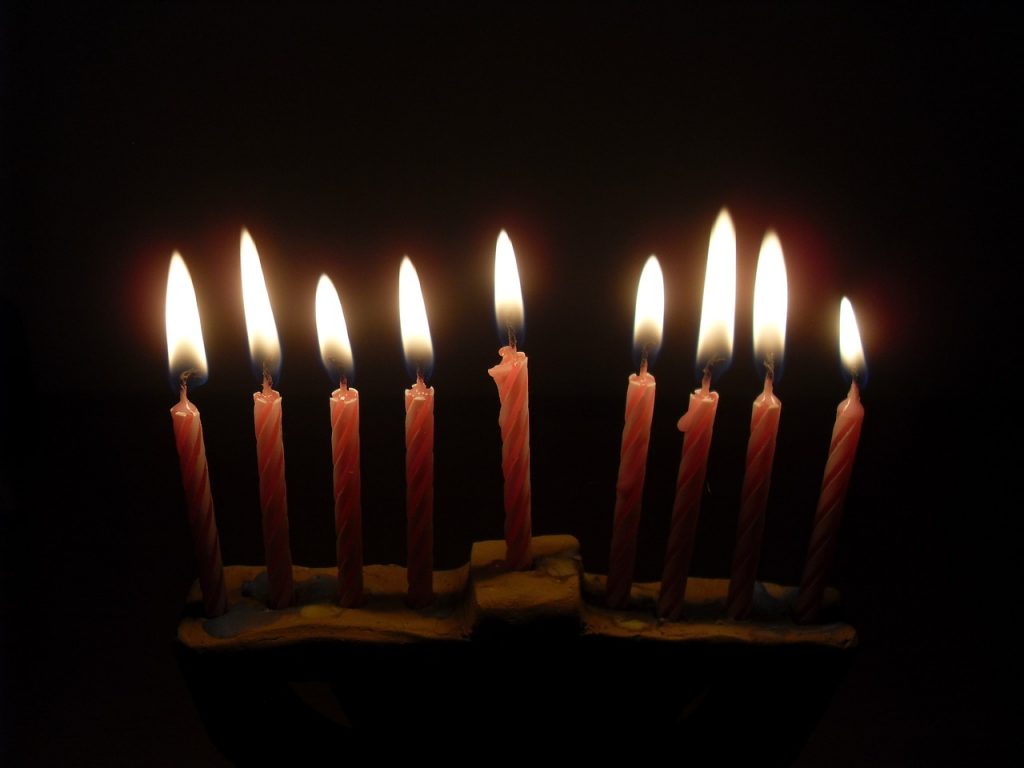
The eighth night of Hanukkah
Let’s get something straight from the get go: Hanukkah and Christmas have only three things in common. A. They both occur at times of the year when it gets dark early. B. They both involve light and C. They both fall on the 25th of a month.
That’s it. Period. Everything else is an American “keeping up with the Jones’s” phenomenon.
Even though both holidays take place late in the year, one is always pinned to a very specific day and month. Thus Christmas always falls on the 25th of December. The other is tied to the phases of the moon. Does it surprise you both celebrations fall on the 25th of a month? Hanukkah is celebrated on the 25th, but it is not always December 25th. It is observed on the 25th day of the Hebrew month of Kislev, which only rarely falls on the 25th of December, as it will this year.
In 2016, Hanukkah eve falls exactly on Christmas Eve and its first day coincides with Christmas. That, on average, happens only four times in a century. So this year I’d expect the celebrations to be big and highly multicultural, especially in interfaith families.
So why am I suggesting that it is a mistake to conflate the two holidays? For one, Christmas is the biggest, most important Christian observance, while Hanukkah is a minor Jewish holiday. So minor in fact, that in Israel it is not a national holiday and businesses aren’t closed. Only school children have the holiday off.
In the old country (Europe) Hanukkah was given barely a notice by most Jews. Before WWII, Hanukkah in Europe was time to light the candles, fry some potato pancakes
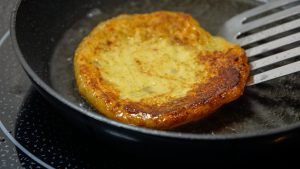
A potato pancake; a latkah on Hanukkah
and, if the budget allowed, give the children a few coins, but not much more. No hoopla, no decorations, no eight days of gifts. I remember asking my father how his family celebrated Hanukkah in pre WWII Lodz, Poland. He’d roll his eyes and laugh, “We were lucky if there was enough money for the potatoes.” As for gifts, he’d say, “I always waited to get new shoes in time for Passover. That was the only holiday when I got what you might call a gift, and don’t forget, many were far poorer than we were.”
 It wasn’t until the extreme commercialization of Christmas in America that some Jews began to feel left out of all the shopping brouhaha. That is when American Hanukkah began to grow in stature like a loaf of Wonder Bread pumped up with air. It’s quite easy to see why Jewish children could feel dispirited seeing their peers in a frenzy of selecting fragrant trees, stringing lights, pulling out favorite ornaments from boxes in the attic and counting the ever growing piles of gift boxes under Christmas trees.
It wasn’t until the extreme commercialization of Christmas in America that some Jews began to feel left out of all the shopping brouhaha. That is when American Hanukkah began to grow in stature like a loaf of Wonder Bread pumped up with air. It’s quite easy to see why Jewish children could feel dispirited seeing their peers in a frenzy of selecting fragrant trees, stringing lights, pulling out favorite ornaments from boxes in the attic and counting the ever growing piles of gift boxes under Christmas trees.
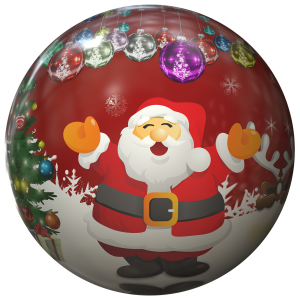 Once the Elf on the Shelf took over and Santa Claus considered changing his team of reindeer for a sleek red Cadillac, all hell broke loose.
Once the Elf on the Shelf took over and Santa Claus considered changing his team of reindeer for a sleek red Cadillac, all hell broke loose. 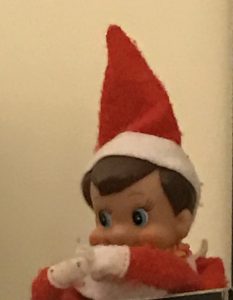 Jews and Christians were spurred to even more shopping. The Atlantic columnist, Kate Tuttle called the Elf “a marketing juggernaut dressed up as a tradition.”
Jews and Christians were spurred to even more shopping. The Atlantic columnist, Kate Tuttle called the Elf “a marketing juggernaut dressed up as a tradition.”
Jewish parents now pull out all stops too. Not a Hanukkah gift, but eight gifts, one for each day. Ornaments in the shapes of dreidels and menorahs to hang, if not on a tree, everywhere and anywhere, and horror of horrors, now even a Mensch on a Bensch! I was somewhat relieved to learn that, unlike the Elf on the Shelf who is to spy on bad children and report their misdeeds to Santa, the Mensch is supposed to teach children how to be a mensch—a good person. But still…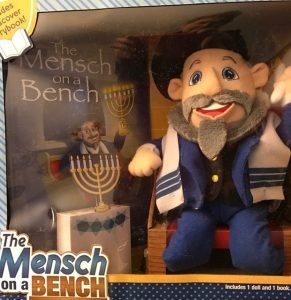
Not to be outdone by the manufacturers of The Mensch are others who quickly gave birth to a Yamaclaus hat—a Hanukkah themed yarmulke (or kippah in Hebrew) that comes complete with a white pom pom embedded in the faux red fur cap with white trim. How about a Jewish style gingerbread house? Voila! We have it this season too. It is same design, same cardboard dough, but the icing is blue and white. Presto! We now have a Hanukkah House.
All of these accouterments obscure the purpose and meaning of the holidays. I suppose that is one other thing Christmas and Hanukkah do have in common. Though I don’t know it from personal experience, I am told that Christmas celebrations often overlook the focus on the birth of Jesus. Ostentatious Hanukkah parties forget the celebration is about the victory of the Maccabean Jews over the powerful Syrian-Greek empire’s attempt to Hellenize them.
How often do we recall, in between the potato pancakes and the jelly donuts, that it is about regaining control Jerusalem and the temple? As Bethany Mandel, the Forward journalist, said in her recent article: “At its core, Hanukkah is about a fight against total Jewish assimilation into the prevailing culture of the day.”
The oil, that allegedly lasted eight days, is quite incidental, but miracles do make for a good story.
Where might this imitation game stop? When someone comes up with a Jewish crèche and kings bearing gifts? Come to think of it, baby Jesus is Jewish, so we are halfway there already.
Happy Holidays everyone!
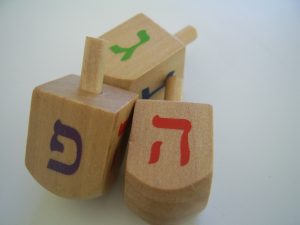
A favorite Hanukkah game: “A Great Miracle Happened Here”
